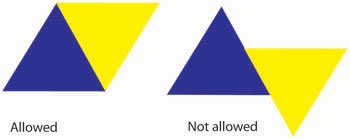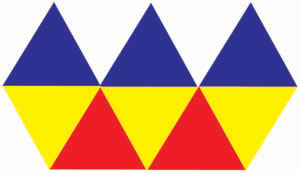Copyright © University of Cambridge. All rights reserved.
'Triangles in the Middle' printed from https://nrich.maths.org/
Show menu
This is one of a series of problems designed to develop learners' team working skills. Other tasks in the series can be found by going to this article.
What are you aiming to do?
For the task:
The team has to recreate a design comprising equilateral triangles (created by the designer) by asking as few questions as possible.As a team:
- Listening and finding out what others think
- Giving reasons for ideas
- Pulling ideas together
- Finding out whether the group is ready to make a decision.
Getting started
You will be working in a
team of four or five. You will need two sets of 12 triangles three
each of four colours. The image above uses 8 triangles of 3
different colours. You might wish to start with just two colours
and fewer triangles until you have some experience of the
task.
Choose someone in the
group to be the designer. If you try this task more than once, team
members should take turns at playing this role.
Give one set of triangles
to the designer and the other identical set to the rest of the
team.
You may also wish to
choose someone to be the observer (a really good idea if there
are more than four people in the team).
Tackling the problem
Without the rest of the
group seeing, the designer creates a design of touching triangles
using some or all of the triangles available. Triangles must have
one side horizontal and touch at least one other triangle along at
least one side, with no overlap.

Using the rules for
asking questions, and checking that they all agree first, the team
takes turns to ask the designer questions that will help them
recreate the triangle design.
When the team thinks they
have the correct design they can check with the designer and the
task ends.
At the end, the observer
gives feedback about the way the team worked together, highlighting
strengths and ways that they could improve next time. The team
discuss the feedback and how they think they worked.
Task Rules:
- You must agree any question before asking the designer.
- The team can only ask questions of the type listed in the rules.
- The team must take turns in asking questions.
- The designer can only answer "Yes", "No" or give a number or a colour.
Try to find the pattern using as few questions as possible.
Designer guidelines:
- You do not have to use all the triangles.
- Triangles must have a horizontal side.
- All triangles must touch at least one other triangle.
- The sides of adjacent triangles must touch along the whole of their length.
- You can only answer "Yes", "No", with a colour or a number.
- You only answer a question if the team has discussed and agreed it first.
Team question rules:
The team can ask
questions about:
- the number of triangles,
- the number of triangles of each colour,
- the number of "rows",
- the number of triangles in each "row'"
- the orientation of triangles,
- the colours of touching triangles (e.g. How many red triangles touch the yellow triangle?),
- the symmetry properties of the design,
- any "holes" in the design.
Note: you cannot ask the
designer to describe the position of a particular triangle.
Observer Guidelines:
Your role is to:
- identify the times when reasons for ideas are given by members of the team,
- check that everyone agrees before a question is asked,
- check that the questions fit those allowed in the rules,
- check that members of the team take it in turn to ask questions,
- count the number of questions the team asks.
